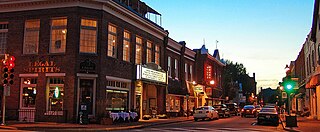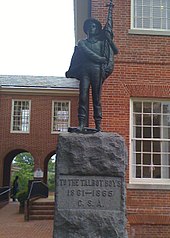
Talbot County is a county located in the U.S. state of Maryland. As of the 2020 census, the population was 37,526. Its county seat is Easton. The county was named for Lady Grace Talbot, the wife of Sir Robert Talbot, an Anglo-Irish statesman, and the sister of Lord Baltimore. The county is part of the Eastern Shore region of the state.

Easton is an incorporated town in and the county seat of Talbot County, Maryland, United States. The population was 17,101 at the 2020 census, with an estimated population of 17,342 in 2022. The primary ZIP Code is 21601, and the secondary is 21606. The primary phone exchange is 822, the auxiliary exchanges are 820, 763, and 770, and the area code is 410.

During the American Civil War (1861–1865), Maryland, a slave state, was one of the border states, straddling the South and North. Despite some popular support for the cause of the Confederate States of America, Maryland did not secede during the Civil War. Governor Thomas H. Hicks, despite his early sympathies for the South, helped prevent the state from seceding.

Richard Bennett Carmichael was an American politician from Maryland.

The Queen Anne's County Courthouse is the oldest courthouse still in use in the state of Maryland. The building houses the judge for the Queen Anne's County Circuit Court, the judge's chambers, a courtroom, a jurors' assembly room, clerks offices and a small detention lock-up.

The Baltimore City Circuit Courthouses are state judicial facilities located in downtown Baltimore, Maryland. They face each other in the 100 block of North Calvert Street, between East Lexington Street on the north and East Fayette Street on the south across from the Battle Monument Square (1815-1822), which held the original site of the first colonial era courthouse for Baltimore County and Town, after moving the Baltimore County seat in 1767 to the burgeoning port town on the Patapsco River established in 1729-1730.
The District Court of Maryland for Baltimore County District Courthouses are located in Towson, Catonsville and Essex and serve as the courts of first impression for the majority of residents in the state of Maryland. Jurisdiction of the District Court includes most landlord- tenant cases, small claims for amounts up to $5,000, replevin actions, motor vehicle violations, misdemeanors, certain felonies, and peace and protective orders. The District Courts also have concurrent jurisdiction with the Circuit Court over civil lawsuits where the amount in controversy is between $5,001 and $30,000.

The Cecil County Circuit Courthouse is located in Elkton, Maryland. The courthouse houses the chambers and courtrooms for the 4 judges of the Circuit Court for Cecil County, as well as the clerk's offices, jurors' assembly room, the law library and masters' offices. On Friday, January 3, 2014 Judge Brenda Sexton was sworn in as Cecil County's 4th Circuit Court Judge. She is filling a seat newly created by the Maryland legislature.

The Confederate Monument in Murray is a statue located in the northeast corner of the Calloway County Courthouse in Murray, Kentucky. It commemorates the 800 citizens of the county who served in the Confederate Army during the American Civil War, and is one of several Confederate monuments in Kentucky featuring Robert E. Lee. There is another one in Bardstown KY. Despite recent controversy, the Calloway County Fiscal Court voted to keep the statue on its grounds in July 2020.

The Confederate Monument in Owensboro, Ky., was a 16-foot-tall, two-part object — a 7-foot-tall bronze sculpture atop a 9-foot-tall granite pedestal — located at the southwest corner of the Daviess County Courthouse lawn, at the intersection of Third and Frederica Streets, in Owensboro, Kentucky. Nearly 122 years after the monument was dedicated in September 1900, the monument was dismantled in 2022, beginning with the removal of the sculpture in May 2022; the sculpture was placed in storage, pending a decision on what to do with it.
Confederate monuments and memorials in the United States include public displays and symbols of the Confederate States of America (CSA), Confederate leaders, or Confederate soldiers of the American Civil War. Many monuments and memorials have been or will be removed under great controversy. Part of the commemoration of the American Civil War, these symbols include monuments and statues, flags, holidays and other observances, and the names of schools, roads, parks, bridges, buildings, counties, cities, lakes, dams, military bases, and other public structures. In a December 2018 special report, Smithsonian Magazine stated, "over the past ten years, taxpayers have directed at least $40 million to Confederate monuments—statues, homes, parks, museums, libraries, and cemeteries—and to Confederate heritage organizations."

The Historic Fairfax County Courthouse is one of the oldest buildings in Fairfax, Virginia. It was constructed in 1799 to serve as the seat of government in Fairfax County. During the American Civil War, the first Confederate officer casualty of the war took place on the courthouse grounds and the building was occupied by both sides in the conflict. Today, the original courthouse building is part of the larger courthouse site that serves the local government of Fairfax County.

The Baltimore City Sheriff's Office is the law enforcement arm of the Circuit Court of Maryland, serving Baltimore, Maryland. The office is headquartered in Courthouse West of the Baltimore City Circuit Courthouses, which also serves as the sites for Baltimore City branch of the Circuit Court of Maryland.

John Baker White was a 19th-century American military officer, lawyer, court clerk, and civil servant in the U.S. state of Virginia.

Old Roanoke County Courthouse is a historic courthouse building located in Salem, Virginia. It was built in 1909-1910 and is a three-story, Classical Revival-style, yellow brick building. The front façade features a three-story, tetra-style Ionic order portico. The courthouse has a hipped roof topped by a cupola, which is topped by an eagle. A rear addition was built in 1948–1949. The building housed Roanoke County, Virginia county offices until they moved to a new building in 1985.

The Howard County Courthouse is a historic building in Ellicott City, Maryland that was the courthouse for Howard County's Circuit Court from 1843 to 2021.
The current Burke County Courthouse is located at 201 South Green Street, Morganton, Burke County, North Carolina and operates as the courthouse for Burke County. It was opened in 1976 to replace the Old Burke County Courthouse. The old courthouse, in use by 1837, is listed on the National Register of Historic Places.

There are more than 160 monuments and memorials to the Confederate States of America and associated figures that have been removed from public spaces in the United States, all but five of which have been since 2015. Some have been removed by state and local governments; others have been torn down by protestors.
White Marylanders are White Americans living in Maryland. As of 2019, they comprise 57.3% of the state's population. 49.8% of the population is non-Hispanic white, making Maryland a majority minority state. The regions of Western Maryland, Southern Maryland and the Eastern Shore all have majority white populations. Many white Marylanders also live in Central Maryland, including Baltimore, as well as in the suburbs of Washington, D.C. Garrett County (97.5%) and Carroll County (91.9%) are the counties with the highest percentage of white Americans. Garrett and Carroll counties also have the highest percentage of non-Hispanic whites at 96.3% and 88.7%, respectively. Prince George's County (27%), Baltimore (30.4%), and Charles County (42.8%) have the lowest percentages of white people. Prince George's County has the lowest percentage of non-Hispanic whites, at 12.5% of the population. White Marylanders are a minority in Baltimore, Cambridge, Charles County, Jessup, Owings Mills, Prince George's County, Randallstown, and White Oak. Non-Hispanic whites are the plurality in Montgomery County, Columbia, Elkridge, Reisterstown, Salisbury, and Severn.


















